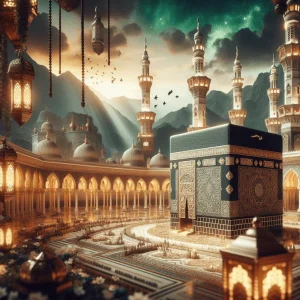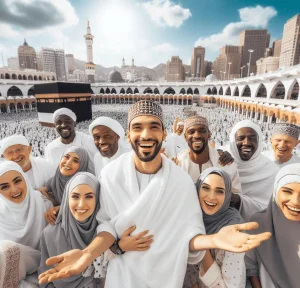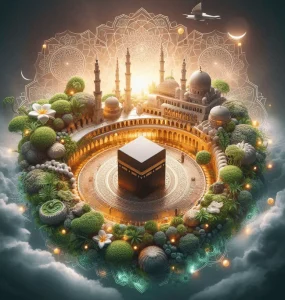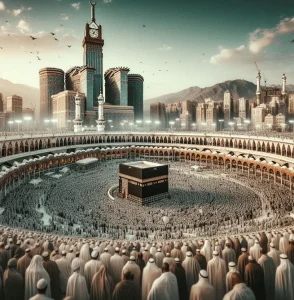Table of Contents
Islamic Feast of Sacrifice In the vibrant tapestry of Islamic traditions, the Islamic Feast of Sacrifice stands as a beacon of spiritual significance, communal unity, and joyous celebration. This sacred occasion, known as Eid al-Adha in Arabic, holds profound importance for Muslims worldwide, commemorating the unwavering obedience and devotion of Prophet Ibrahim (Abraham) to the divine command. As families and communities gather to honor this auspicious day, let us explore the customs, rituals, and heartfelt traditions that embody the essence of the Islamic Feast of Sacrifice.

Understanding the Significance
At the heart of the Islamic Feast of Sacrifice lies the timeless narrative of Prophet Ibrahim’s willingness to submit to Allah’s will, epitomized by his readiness to sacrifice his beloved son, Ismail (Ishmael). Moved by Ibrahim’s unwavering faith, Allah intervened, providing a ram as a substitute for Ismail, thus symbolizing the paramount importance of obedience, trust, and surrender to the divine decree.
Symbolism and Spiritual Reflection
The Islamic Feast of Sacrifice serves as a profound reminder of the virtues of sacrifice, humility, and gratitude. It beckons believers to reflect on the essence of submission to the divine will and the rewards that flow from unwavering faith. Just as Ibrahim’s devotion was tested and rewarded, Muslims are encouraged to examine their own commitment to righteousness, selflessness, and compassion in their daily lives.
Rituals and Traditions
Qurbani: The Act of Sacrifice
Central to the observance of the Islamic Feast of Sacrifice is the ritual of Qurbani, or animal sacrifice. Following the example of Prophet Ibrahim, Muslims around the world engage in the slaughtering of livestock, typically sheep, goats, cows, or camels, as an expression of devotion and obedience to Allah. The meat from the sacrificed animal is then distributed among family, friends, and the less fortunate, symbolizing the spirit of sharing, generosity, and communal solidarity.
Communal Prayers and Gatherings
On the morning of Eid al-Adha, Muslims gather in mosques, open fields, or designated prayer grounds to perform the Eid Salah, or special prayers, commemorating the occasion. Clad in their finest attire, believers engage in fervent supplication, gratitude, and remembrance, seeking divine blessings and forgiveness. The Eid Salah is often accompanied by a sermon, delivered by the imam, emphasizing the significance of sacrifice, compassion, and steadfast faith.
Celebratory Customs and Delights
Exchange of Greetings and Gifts
Eid al-Adha unfolds as a joyous occasion marked by the exchange of heartfelt greetings, blessings, and gifts among family and friends. The phrase “Eid Mubarak”, meaning “Blessed Eid”, resonates with warmth and affection, uniting loved ones in shared felicity and goodwill. From elaborate feasts to intricately crafted sweets, every gesture embodies the spirit of generosity, hospitality, and communal joy.
Festive Feasting and Culinary Delights
The culinary delights of the Islamic Feast of Sacrifice tantalize the senses, beckoning believers to indulge in a cornucopia of flavors and aromas. From succulent kebabs and aromatic biryani to decadent desserts like baklava and halva, the feast reflects the diverse culinary heritage of the Muslim world. Families come together to savor these delectable treats, fostering bonds of kinship, joy, and shared abundance.
Spreading Joy and Compassion
Acts of Charity and Community Service
In the spirit of Eid al-Adha, Muslims are encouraged to extend a hand of compassion and generosity to those in need. From donating to charitable organizations to volunteering at local shelters and soup kitchens, believers embody the principles of social justice, empathy, and solidarity. The Islamic Feast of Sacrifice serves as a poignant reminder of the importance of caring for the marginalized, vulnerable, and marginalized members of society.
Visiting Friends and Neighbors
As the festive spirit permeates the air, Muslims embark on a tradition of visiting friends, neighbors, and relatives, exchanging warm wishes and culinary delights. These gatherings foster a sense of community, camaraderie, and mutual respect, transcending barriers of culture, language, and background. From sharing anecdotes to partaking in traditional rituals, each visit becomes a cherished opportunity to strengthen bonds and forge lasting friendships.
Islamic Feast of Sacrifice
In the mosaic of human experience, the Islamic Feast of Sacrifice shines as a radiant expression of faith, unity, and joyous celebration. From the solemn rituals of Qurbani to the festive feasts and heartfelt gatherings, every aspect of Eid al-Adha embodies the essence of devotion, gratitude, and communal solidarity.
As Muslims worldwide come together to honor this sacred occasion, let us embrace the spirit of sacrifice, compassion, and shared humanity. Through acts of kindness, generosity, and prayer, we reaffirm our commitment to the timeless values of faith, love, and compassion, enriching our lives and communities with the blessings of the Islamic Feast of Sacrifice.






More Stories
Tales of Wonder: Unraveling the Islamic Heritage Mystery
In the Footsteps of Greatness: Journeying Through Islamic Heritage Sites
Echoes of History: Rediscovering Islamic Heritage Around the World